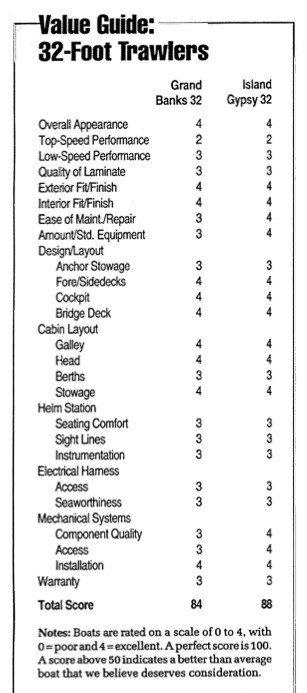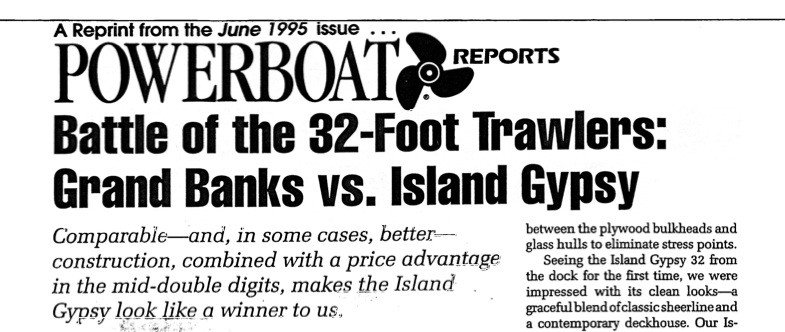SeaHorse II wrote:
* Much research into both boats leads me to agree with Eric. The GB name is better known, but as to quality, many in the know would disagree.
***
*Well, it all depends on what you read. I've read dozens of articles over the years all sorts of magazines that say exactly the opposite.* That GB is absolute*tops in quality, value, blah, blah, blah.* I don't particularly agree with this, by the way.*
But what GB (American Marine, actually)
DID do is bring consistency to this kind of boat at a time when there wasn't much of it.* The Taiwan-built boats tended to vary all over the map in terms of quality as did a lot of other makes and, of course, the custom-builds.* With their Grand Banks line, first in wood and later in fiberglass, what American Marine did was bring a high*level of consistent quality from boat to boat.
Are there better designed, better built production boats?* Sure, although from what I've seen and been told by Island Gypsy*owners on our an adjacent docks I'm not sure IG is necessarily*one of them.* But if there's anything that Grand Banks brought to the boat manufacturing table starting in the mid-1960s, it was consistency.* You could depend on a GB being what the manufacturer said it was all across the line.
Magazine reviews don't mean much as, first of all, they can't piss off their advertisers so will find SOMETHING good about any product no matter how crappy it might be.* Second, magazine writers are as biased as everyone else.* So one guy might think an IG or CHB is as good or better a buy as a GB and the next guy might think the opposite.
More telling, I think, are the prices the boats command over time which reflect the value the buyers, owners, dealers, brokers, and sellers put on them.*
None of this is to say I think an IG is a lesser boat than a GB.* But I don't think it's any better.* Actually I would say they are very much the same, in no small part because the "Kong" in Kong & Halverson was an engineer for American Marine and was*heavily involved in the Grand Banks line*before he eventually left to team up with Halverson and create the Island Gypsy line.
PS-- I should proabably add that I say all this not from a position of being a particular Grand Banks fan.* We have one and it serves us well but it is by no means our defintion of an ideal boat.**Aestheticallyi I*think the lines are awkward and top-heavy and*the sheer line has a major design*flaw in it.* The windows are too big, the flying bridge is a waste of space and weight, and the proportions of the main cabin to the trunk and forward cabin are all wrong.* It's not an ugly boat but it's definitely not a pretty one either.
As I've stated somewhere else, to both my wife and I the ideal design for a recreational cruising boat is a pilothouse design.* In terms of absolute top-notch quality and aesthetics there is only one boat I am actually familiar with that fills the bill, and that is the Fleming.* The de Fever 46 also fills our bill from an asthetics standpoint, which stands to reason as the American Marine Alaskan Series was based on a deFever design, which is also why the Fleming looks like the deFever looks like an Alaskan (Tony Fleming ran the American Marine yard for awhile before leaving to start his own company).* But I don't know anything personally about the build quality, etc. of the deFever 46*other than there is one on the next dock over from us that is an absolute beauty.
Another very good looking boat but one I know virtually nothing about is the Krogen Express.
Compared to these boats a GB and an IG and in fact*all the similar looking "trawlers" are tubs

**Strictly in*my opinion of course......
-- Edited by Marin on Tuesday 2nd of August 2011 05:46:04 PM




